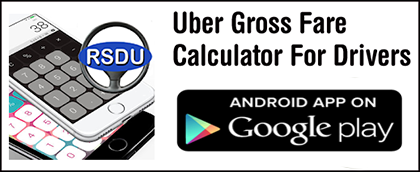When it comes to car maintenance, insurance, petrol, major repairs, licensing and GST, Uber drivers carry all the expenses and take most of the risk. Current base fares in Melbourne (and most other Cities in Australia, except maybe for Sydney) are too low and leave very little take home profit for drivers after calculating all car expenses and most importantly, fast car value depreciation.
Full time drivers are often left with approximately $10 per hour take home pay, that’s before deducting income tax and superannuation, well below the minimum wage in Australia. In fact, in most cases the pay is too low to even allow for a new car, once the old car is ready to retire after about two years. A full time Melbourne Uber driver is likely to drive about 1,100km on average per week and experience accelerated wear and tear, often major repairs and fast vehicle value depreciation. Drivers also often have to deal with widely fluctuating petrol prices, which further bite into their very little profit (if any).
Uber calls their drivers “partners” and misclassify them as “independent contractors”.
Unlike real independent contractors Uber drivers are heavily micromanaged by the company. They have no say over the fare price or passenger “where to” destination (until passenger is in the car and the trip is started). Drivers do not directly collect payments from the passenger or look after customer support, account, billing, or invoicing, these are all being done by Uber. Drivers don’t even have access to passenger information except for the passenger’s first name.
Uber drivers do not operate a real business and unable to build good-will or later sell “their” business. Most Uber drivers earn well below of what an equivalent business operator is expected to earn and should not be qualified as businesses really.
Uber used to advertise in Victoria drivers can earn $30-$35 per hour which is very far from the truth. Drivers get to keep less than $10 per hour nowdays, considering all car expenses, repair and maintenance, licensing and vehicle depreciation. Well below minimum wage, not to mention the risk of driving long unlimited hours per day just to make ends meet. Uber avoids paying driver worker entitlement by using “sham contracting” tactics. Drivers receive no fair work entitlements, superannuation, overtime, leave, or sick leave etc. while being paid well under minimum wage. Many drivers would prefer to remain classified as sub contractors BUT would also like to see proper remuneration for their efforts and investment. Only a fair and acceptable base fare model can achieve that.
Below is an example of gross income and expenses based on numbers provided by two full – time drivers in Victoria. Notice the difference between Uber’s blown up promises and the reality of the less-than-minimum wage earnings of full-time drivers.
Driver 1 in an average 40 hours working week
Average gross fare including surge: $1142
Average commission fee to Uber: $285.50 (25 per cent of gross fare fee)
Averages 250 kms a shift, 59,800 km a year
Car Maintenance: $67 per week ($3484 a year)
Petrol: $160-$190 per week
Insurance: $26 ($1350 a year including full ridesharing cover)
Roadside Assistance: $3 a week ($160 a year)
Rego + TAC: $15 a week ($780 a year)
GST due: about $104 per week
Car cleaning: $10 a week
Water and mints: $10 a week
Net Weekly earnings: $446.50 before superannuation and income tax
Net Hourly earnings: $11.16 before superannuation, income tax and fast car value deprecation
* The above figures do not include fast car value depreciation or the likelihood of major engine or gearbox breakdowns/repairs, insurance excess or road fines. These are likely added “bonuses” when/if they occur.
Driver 2 in an average 40 hours working week
Average gross fare including surge: $935
Average fee to Uber: $185 (20 per cent of gross fare fee)
Averages 220 kms a shift, 54,780 km a year
Car Maintenance: $30 ($1600 a year)
Petrol: $110 Insurance: $11 ($559 a year)
Rego + TAC: $13 ($680 a year)
GST: $93
Car cleaning: $10 a week
Water and mints: $10 a week
Weekly earnings: $473 before superannuation and income tax
Hourly earnings: $11.82 before superannuation, income tax and fast car value deprecation
* The above figures do not include fast car value depreciation or the likelihood of major engine or gearbox breakdowns/repairs, insurance excess or road fines. These are likely added “bonuses” when/if they occur.
[Update 18/12/2017: Following RSDU’s request for FWO to investigate Uber suspected sham contracting, Uber has now been forced to increased base rates by approx 15% in Victoria and QLD as well as release a number of new driver app features. Read more here.]
Drivers GST Implications
Uber refuses to pay its GST obligations in Australia. The ATO in a recent ruling forced all drivers to foot the entire GST bill. Unlike normal circumstances, where a business must register and pay GST only when its yearly income is above $75,000, Uber drivers must register an ABN and start paying GST starting at the 1st dollar earned. Drivers must also pay Uber’s share of GST (GST on the 20% or 25% commission charged to them by Uber) and can not claim this part as GST input credit. In other words Uber Australia are calculating commissions on GST money the driver must pay to the ATO.
[Update 18/12/2017: While Uber now pay their own share of GST on for the commission that they charge drivers, they are still in the wrong cutting that commissions on the GST portion of the fare, the portion that drivers must pay to the ATO. ]
Drivers have zero job security
Uber drivers can get deactivated by Uber (Uber’s language for “fired”) without a reason or explanation, at any given time with no fair work entitlements whatsoever. Drivers who took car leases or car loans can find themselves overnight without a job while having to continue servicing expensive car obligations which may lead many of them into bankruptcy. It may take one disgruntled passenger making a complaint for Uber to immediately deactivate the said driver indefinitely. There is no phone number the driver can call to even discuss the matter.
Very fast car value depreciation –
Most of driver earnings are offset by their very fast car value depreciation.
Driving for Uber full time means accelerated vehicle wear and tear, constant services (average uber car travels about 1,100km per week), a more likely chance of incurring costly traffic and parking fines, and/or expensive engine repairs that can run into the thousands of dollars every year.
Uber places no limit on the number of driving hours
Uber places no limit on how long a “shift” (number of hours drivers can drive continuously) can be. Cases of drivers doing 14-16 hours per day, just so they can pay their car lease/loans liabilities and have some spare money left, are quite common and are becoming extremely dangerous. Tales of Uber drivers often nodding while waiting at traffic lights, making their passengers fear for their safety, are quite common and a direct result of this policy. Arguably, being an independent contractor, a driver should be responsible for their own working hours, however taken into account the abovementioned lack of bare minimum pay rules, job security or any kind of fair work/work safe support from the government in place, many feel pressured into a life that is nothing short of modern day slavery, the digitally flavoured kind, where people are enslaved by a mobile app.
[Update 18/12/2017: Following RSDU’s request for FWO to investigate suspected sham contracting and call to limit driving hours, Uber has now been forced to limit driving shifts to a maximum of 12 hours across Australia. Read more here.]
Last but not least –
For many drivers, Uber isn’t a career path anymore, but a political roadblock. “They tell us we are independent contractors,” says one driver, but “they control each and every movement of us…. They can fire me anytime, they can hire me anytime…. I have to work with their rules, but I’m still not their employee and being paid peanuts. It’s a sweatshop.”
RSDU is calling on Victorian Government to consider all aspects of drivers’ working conditions, as they are working on regulation that will legalise ridesharing in Victoria.
©2017-2018, this article is the copyright of RideShareDriversUnited.com and may not be reproduced in any other shape or form without expressed written permission.
- Why are Uber drivers in Melbourne not happy
- What are drivers demanding
- How YOU can help make this protest effective
- Join RSDU and stay informed, it’s free
- Join our Facebook group
- How to contact RSDU
- Join the RSDU forums
- Join our Melbourne Whatsapp group and stay updated in real time
RSDU is committed to helping RideShare drivers from all around the world. Please contact us should you wish to start getting organised and start a collective action in your home country/state.





